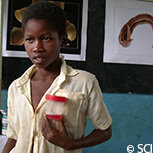Schistosomiasis and Soil-transmitted helminths

Schistosomiasis is a parasitic disease caused by trematode flatworms. Larval forms of these parasites are released by freshwater snails, which then penetrate human skin of people bathing or swimming. The larvae live in the blood vessels and when female larvae mature, they release eggs, some of which are passed out of the body, while others are trapped in body tissues causing damage. There are two forms of schistosomiasis. Urinary schistosomiasis results in progressive damage to the bladder, ureters and kidneys. Intestinal schistosomiasis results in progressive enlargement of the liver and spleen, intestinal damage, and hypertension of the abdominal blood vessels. The disease is treated with a single dose of praziquantel; the disease can be controlled with repeated community distribution.
Soil-transmitted helminth infections are among the most common infections worldwide and affect the poorest and most deprived communities. They are transmitted by eggs present in human faeces which in turn contaminate soil in areas where sanitation is poor. The main species that infect people are the roundworm (Ascaris lumbricoides), the whipworm (Trichuris trichiura) and the hookworms (Necator americanus and Ancylostoma duodenale.)
Soil-transmitted helminth infections are distributed worldwide. The intestinal worms produce a wide range of symptoms including diarrhoea and abdominal pain, general malaise, and weakness. Hookworms cause chronic intestinal blood loss that can result in anaemia. According to WHO, more than 880 million children are in need of treatment for these parasites. Treatment is based on the periodic administration of anthelminthics to groups of people at risk, supported by the need for improvement in sanitation and health education. NNN member Children Without Worms partners with Johnson and Johnson, WHO, GlaxoSmithKline, government ministries of health and education, and multilateral donor agencies and non-governmental organizations to promote comprehensive control of infection with soil-transmitted helminths (STH). Mebendazole and albendazole are donated by Johnson and Johnson and GlaxoSmithKline, respectively, through WHO for the treatment and control of STH.
WHO recommends annual treatment in areas where prevalence rate of soil-transmitted helminthiases is between 20% and 50%, and bi-annual treatment in areas with prevalence rates of over 50%.
Morbidity and symptoms
Morbidity is directly related to worm burden: the greater the number of worms in the infected person, the greater will be the severity of disease.
Soil-transmitted helminths impair the nutritional status of those infected in many ways, sometimes causing death by:
- negatively affecting nutritional status (causing intestinal bleeding, loss of appetite, diarrhoea or dysentery, and reducing absorption of micronutrients);
- worsening school performance;
- causing complications that require surgical intervention (i.e. intestinal obstruction and rectal prolapse).
Concomitant infections with other parasite species are frequent and may have additional effects on nutritional status and organ pathology.